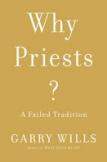Communion Waver
In On Consulting the Faithful in Matters of Doctrine, John Henry Newman argues that indifference among “the educated classes” would result if the faithful were cut off from the study of doctrines and those doctrines made subject simply to fides implicita. Garry Wills’s Why Priests? can be read as a warning, perhaps especially for bishops, that attempting to insulate the priesthood from questions about its past, present or future form will produce, particularly in the wake of the sexual abuse crisis, not just the indifference that Cardinal Newman predicted, but a wholesale rejection of the church’s ordained ministry.
Wills professes no animosity to priests as a group; he simply regards the priesthood as a false development. His other non-negotiable is that the Letter to the Hebrews, particularly when referring to Jesus as priest and by choosing “sacrifice” as the hermeneutical lens through which to view the death of Jesus, is entirely to blame for another false development: a perception of the Eucharist as “a miracle” that only “the sorcerer’s apprentice” (a k a the priest) can accomplish.
As portrayed by Wills, both the ordained priesthood and the theology of the Eucharist as sacrifice have had deleterious effects: The former has been simply a mechanism of control; the latter a source of grotesque longing for the miraculous, a hankering for liquefied blood and for the face of Jesus in a tortilla. Garry Wills takes no prisoners.
Wills assembles an array of evidence—biblical, patristic, historical—as the basis for his rejection of both the ordained priesthood and the eucharistic piety that perpetuates the priesthood. Much like Joe Friday—“just the facts, Ma’am”—Wills presumes that facts present no ambiguity. The difficulty, however, is that the priority given to his conclusions determines the choice of what can serve as a fact.
The most glaring example of Wills’s selectivity in regard to the facts comes in his historical survey of the sacraments. Here the guiding principle is that “priestly imperialism” is central to the development of the Catholic Church’s sacramental system. Accordingly, he presents the theology of St. Thomas Aquinas as a shoddy apologetic and the introduction of individual confession as nothing more than a mechanism to bolster clerical control over the sacrament. The biblical and historical retrieval that guided the post-Vatican II revision of the sacramental rites receives no acknowledgement. Wills allows not even a poetic imagination: thus, the use of “Cana” in the title of pre-marriage courses can aim only at perpetuating “the myth that the wedding at Cana was a Christian sacrament.” While one can grant Wills’s assertion that these courses may not always be helpful, it is difficult to see that any weakness is attributable directly to eisegesis of the fourth Gospel.
Just as disappointing as the book’s selective reading of history is its isolation from the world of contemporary theological scholarship. Wills cites numerous exegetes to support his reading of Hebrews, but none who see it differently, none who might understand “sacrifice” as something other than a blight or Hebrews as more than ideology. Theologians fare even worse: They’re largely absent. Theology cannot validly explain away history, but the relationship between history and faith is more complex than it appears in Why Priests? Contemporary theologies of the reception of tradition do grapple with the questions raised by biblical scholarship and history; they do take seriously the challenges that the development of ministry over time presents to the belief that the ordained ministry is “God-given.” Dialogue with this theology would have been a restraint on Wills’s generalizations, but it might have given his work nuance and texture.
Wills claims that his deconstructions will lead to a healthier church. It is difficult, however, to see how this book will encourage those who dream of a church that is other than a Procrustean bed that compels God’s mystery to conform to one or other set of competing prejudices. In blaming imperialistic “killer priests” for all that ails the church, Wills is as damaging to hope as those who characterize all dissatisfaction in the church as a liberal conspiracy.
Why Priests? is not a book to recommend. Nonetheless, it can be a book from which to learn. Although Wills insists that history is the nemesis of the church’s doctrines and institutions as it lays bare their ideological distortions, this is not the lesson to take from the book, since authentic ecclesial faith need not fear history. The lesson, rather, is that suspicion toward the church’s doctrine and practices, the suspicion so evident in this book, will not yield to an act of authority. Accordingly, if we want the role of the priesthood in the church to be received as a life-giving possibility, we must not attempt to insulate it from critique and discussions that might lead to significant reform. Questions and challenges are not necessarily the denial of grace; they can be an embrace of it. Garry Wills views the priesthood as a zero-sum game: either reject it or accept it uncritically. Must it be so?
This article also appeared in print, under the headline “Communion Waver,” in the March 25, 2013, issue.








